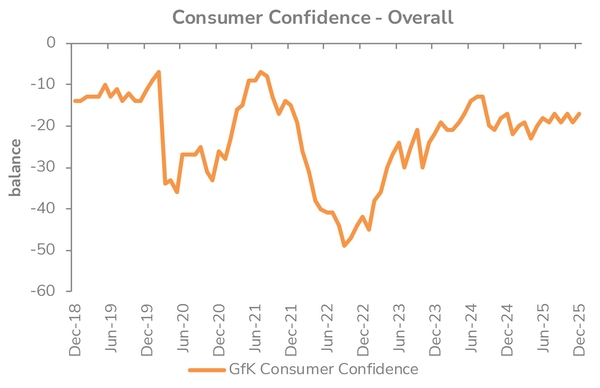Report Summary
Period covered: 30 November - 03 January 2026
3 minute read
Note: This report summary is one or two months behind the current month as standard reporting practice. The content is indicative only and incomplete with certain data undisclosed. Become a member to access this data or take out a free 30 day membership trial now.
Furniture & Flooring - Retail Economics Index
-
Furniture and flooring sales declined by xx% year-on-year in December, marking one of the weakest performances across retail.
-
This continued the challenging trend observed in other big ticket categories, where consumers showed reluctance to commit to high value purchases.
-
However, analysis over a two month period provides a more stable reading of seasonal performance.
-
Across November and December combined, sales were up xx% year-on-year, a notable improvement on the xx% decline recorded during the same period in 2024.
-
This suggests that demand was skewed toward periods of concentrated promotional activity.
Key trading themes and drivers
-
December's year-on-year decline was expected given the exclusion of Black Friday from the comparison base.
-
High promotional intensity in November drew forward demand, and the subsequent lull in early December was only partially offset by Boxing Day sales.
-
Large ticket items such as sofas, beds and wardrobes saw subdued interest until late in the month, when clearance events brought renewed activity.
-
The traditional January sales started early for many retailers, with discounts live from Christmas Day.
-
Smaller scale purchases fared better. Home accessories, storage items and seasonal decor performed steadily, benefitting from gifting and home preparation missions.
-
These categories were more responsive to price signals and less impacted by economic hesitation.
Macroeconomic backdrop
-
Economic conditions remained a headwind. Inflation edged higher to xx%, while core pressures persisted in services and food.
-
Though real wage growth remained positive, sentiment remained cautious, as households faced higher energy bills and the impact of prior mortgage resets.
-
The housing market continued to weigh on home related spending. Prices were broadly flat year-on-year, with limited transaction activity and weak mortgage approvals.
-
Halifax reported a second consecutive monthly price decline in December, highlighting the fragility in housing confidence.
-
Meanwhile, consumer credit data indicated increasing reliance on borrowing.
-
Credit card balances rose by over xx% year-on-year in November, the fastest pace since early 2024, suggesting that a share of Christmas related spending was debt financed.
-
This highlights the ongoing squeeze on disposable incomes and the importance of affordability in purchase decisions.
Outlook
-
The sector enters 2026 with constrained momentum. Although promotional periods in November and late December unlocked some demand, underlying appetite for big ticket furniture remains tempered by macroeconomic pressures.
-
The absence of a strong housing tailwind further limits growth opportunities.
-
Seasonal categories may see a brief lift in early January, but the sector's performance is likely to remain patchy.
-
Sustained recovery will depend on improved housing turnover, falling inflation and greater consumer confidence in the months ahead.
Take out a FREE 30 day membership trial to read the full report.
Confidence rises in December
 Source: GFK, Retail Economics analysis
Source: GFK, Retail Economics analysis